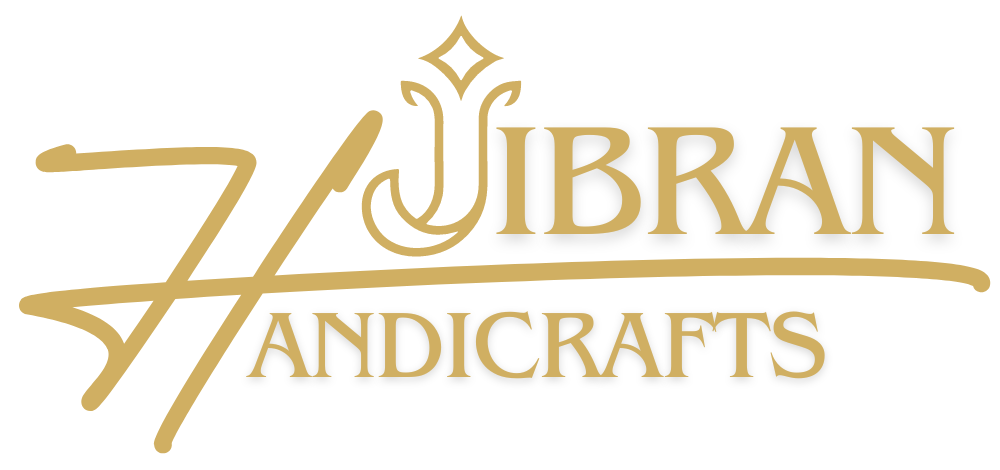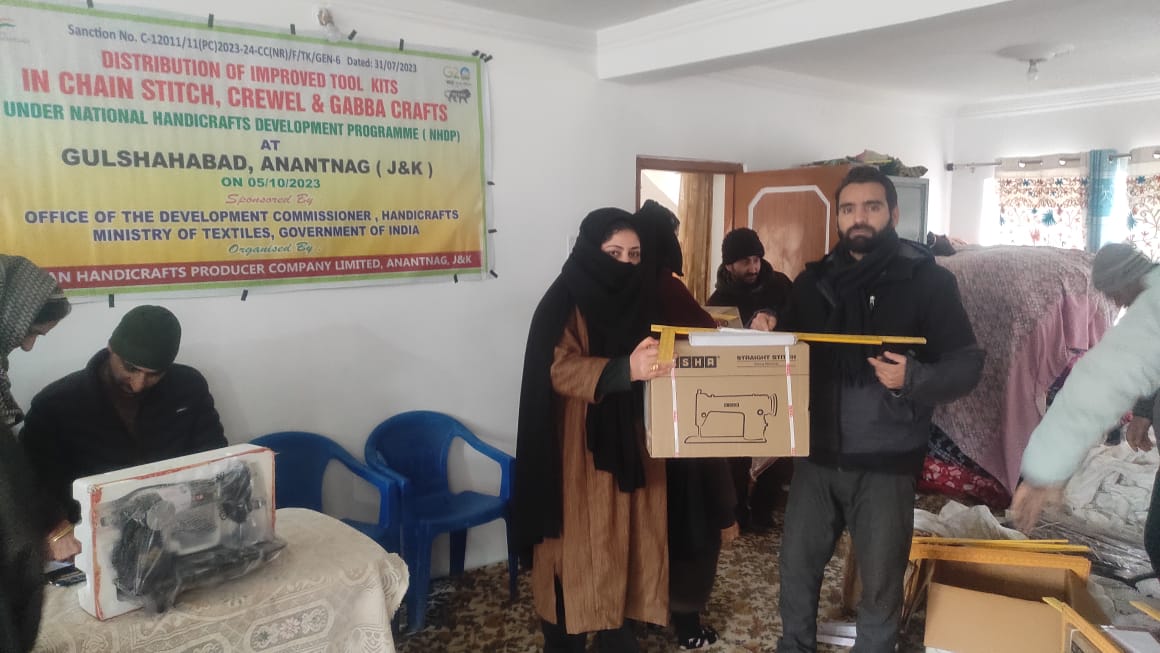Empowering Artisans: Distribution of Improved Toolkits in Chain Stitch, Crewel & Gabba Crafts under NHDP Scheme
In a significant step toward the empowerment of traditional artisans, the Distribution of Improved Toolkits event was recently held in Gulshahabad, Anantnag (J&K) on October 5, 2023. This initiative, part of the National Handicrafts Development Programme (NHDP), focused on providing modern and efficient tools to artisans engaged in Chain Stitch, Crewel, and Gabba crafts—three integral components of Kashmir’s rich handicraft legacy.
Sponsored by the Office of the Development Commissioner (Handicrafts) under the Ministry of Textiles, Government of India, and organized by Jibran Handicrafts Producer Company Limited, Anantnag, this event marked a milestone in the ongoing mission to modernize and support India’s craft-based economy.
Reviving Traditional Crafts through Modern Tools
The handicrafts sector is not just an economic pillar for regions like Jammu & Kashmir; it is also a cultural treasure trove. Crafts such as Chain Stitch embroidery, Crewel work, and Gabba craft are celebrated for their intricate designs and skilled artistry. However, despite their historic and aesthetic value, artisans often struggle with outdated tools, limited market access, and a lack of institutional support.
The NHDP Scheme, designed to enhance the production capacity, competitiveness, and sustainability of India’s handicraft sector, addresses these challenges. The distribution of improved toolkits directly helps artisans to:
Increase productivity
Improve the quality of craftsmanship
Reduce physical strain
Enhance consistency in design
By introducing advanced tools, the initiative helps preserve these crafts while making them more adaptable to modern design sensibilities and global market standards.
About the Crafts: Chain Stitch, Crewel, and Gabba
1. Chain Stitch Embroidery
Chain Stitch is a form of embroidery often used in rug-making and fabric decoration in Kashmir. Artisans use a specialized hook, locally known as “Aari,” to create a chain-like pattern on fabric. The motifs are usually floral and inspired by the natural beauty of the region.
2. Crewel Work
Crewel embroidery involves a thicker thread and is usually worked on drapery fabric. It’s known for its detailed, raised designs and has been a popular form of wall décor and upholstery. The new toolkits aim to enhance the precision and durability of this time-honored technique.
3. Gabba Craft
Gabba refers to old woolen blankets that are appliquéd with colorful chain-stitch embroidery to create floor coverings. Gabba-making recycles used fabrics into artistic and functional items, embodying both tradition and sustainability.
The Venue: Gulshahabad, Anantnag – A Craft Hub
Gulshahabad in Anantnag district is known for its vibrant community of artisans. The event’s location was thoughtfully chosen to directly reach a large population of craft workers who stand to benefit the most from such interventions. It served as a platform to not only distribute the toolkits but also to raise awareness about various government schemes aimed at artisan welfare.
The enthusiastic participation of local craftspeople highlighted the community’s eagerness to adopt new technologies while maintaining the essence of their traditional crafts.
Organizer Spotlight: Jibran Handicrafts Producer Company Limited
Jibran Handicrafts Producer Company Limited, based in Anantnag, is at the forefront of artisan welfare and craft preservation in the region. By organizing this toolkit distribution program, they have reaffirmed their commitment to nurturing and sustaining the handicraft heritage of Kashmir.
Their efforts ensure that grassroots-level interventions reach the real stakeholders—the artisans themselves. The company plays a crucial role in bridging the gap between traditional craftsmanship and contemporary demand.
Sponsor’s Vision: Office of the Development Commissioner (Handicrafts)
The Office of the Development Commissioner (Handicrafts), under the Ministry of Textiles, Government of India, has long been a pillar of support for artisans across the country. The NHDP Scheme is one of its key initiatives aimed at:
Skill development through training programs
Financial support and credit facilitation
Design innovation and technology upgrades
Marketing support and export promotion
The distribution of improved toolkits is a part of this broader framework, intended to empower artisans both economically and creatively.
Benefits of Improved Toolkits Under the NHDP Scheme
The improved toolkits provided under this scheme are tailored to the specific needs of artisans involved in Chain Stitch, Crewel, and Gabba crafts. Some key advantages include:
Higher Efficiency: Reduced time and effort required for each piece of work.
Enhanced Quality: Uniform and cleaner finishes that meet export standards.
Reduced Fatigue: Ergonomic designs help minimize health issues caused by repetitive motions.
Skill Upgradation: Familiarity with new tools helps artisans evolve their techniques.
This initiative is not merely about distributing equipment; it’s about investing in human capital, reviving heritage, and enabling artisans to become self-reliant entrepreneurs.
A Step Toward Atmanirbhar Bharat
The initiative aligns with the Government of India’s Atmanirbhar Bharat Abhiyan (Self-Reliant India Mission), which emphasizes local production and empowerment. By equipping artisans with better tools and resources, the government is not just preserving culture but also creating livelihood opportunities, reducing rural unemployment, and encouraging women’s participation in the economy.
Voices from the Ground
Artisans who received the toolkits expressed gratitude and renewed hope for their craft. Many shared how difficult it had been to continue producing high-quality work with worn-out or rudimentary tools. The new kits will not only improve their working conditions but also make their products more market-competitive.
Conclusion
The Distribution of Improved Toolkits in Chain Stitch, Crewel & Gabba Crafts under the NHDP Scheme, held on October 5, 2023, in Gulshahabad, Anantnag, represents a crucial step forward in the revitalization of India’s handicraft sector. Through strategic collaboration between government bodies and local organizations like Jibran Handicrafts Producer Company Limited, the initiative successfully empowered artisans by giving them access to modern tools, enhancing both their skills and earning potential.
As these artisans embrace change while preserving tradition, they are shaping a resilient, self-sustaining future for India’s cultural economy.



